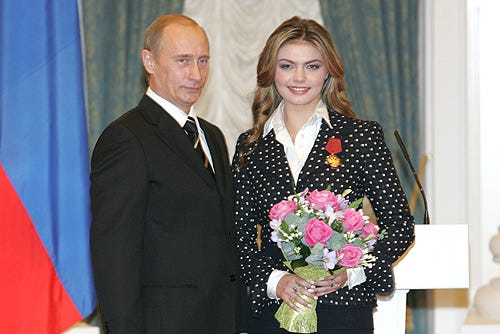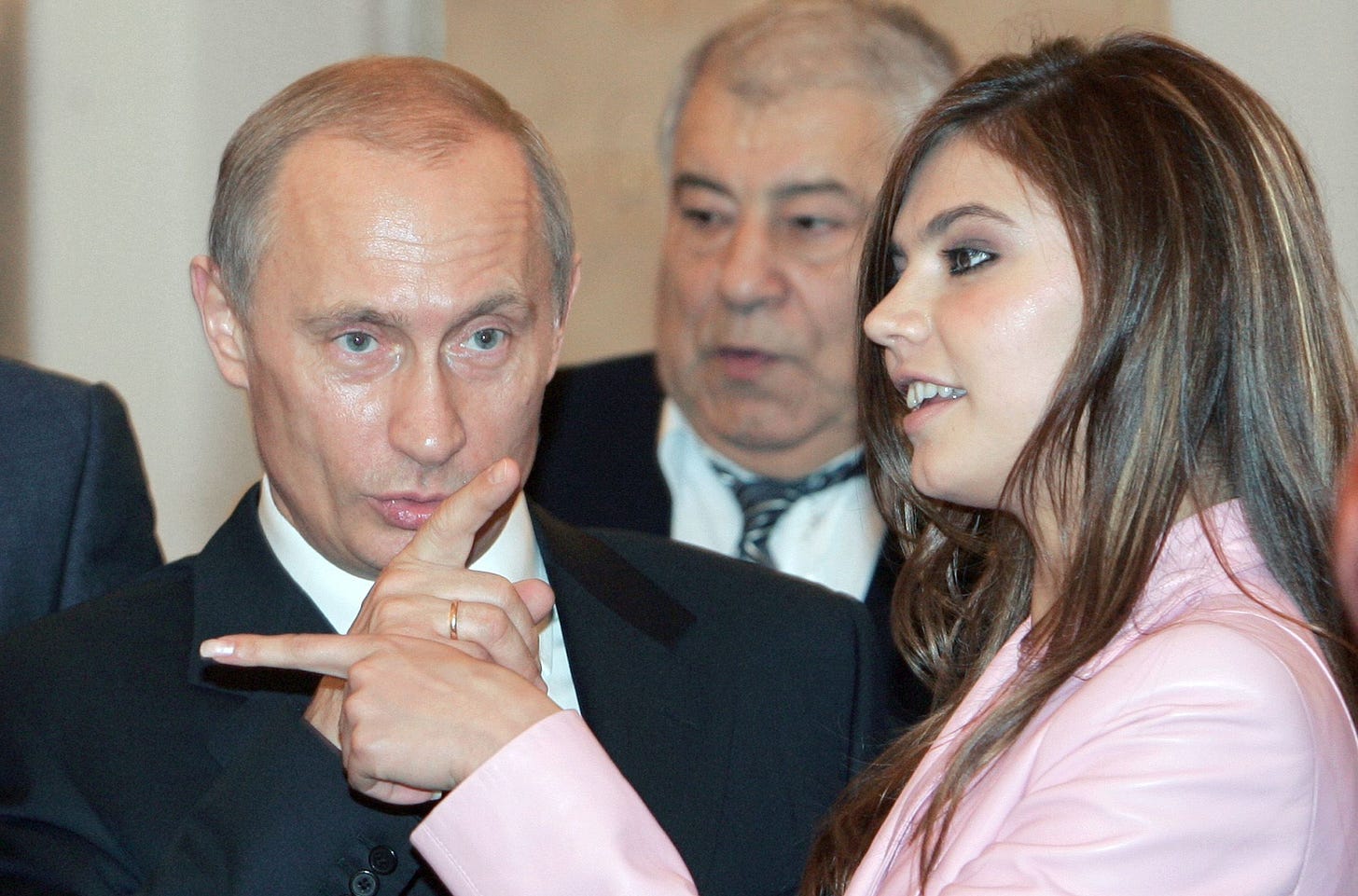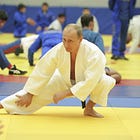The Kremlin, The Coach, and The Mistress
When a legendary coach resigned as Russia’s rhythmic gymnastics head after a power struggle with Putin’s mistress, it underscored the strange dynamics between Russia's elite & its autocratic leader.

Welcome to Sports Politika, a media venture founded by investigative journalist and researcher Karim Zidan that strives to help you understand how sports and politics shape the world around us. Our mission is to offer an independent platform for accessible journalism that raises awareness and empowers understanding.
If you share this vision, please consider supporting us by joining our community and becoming a paid subscriber.
After nearly a quarter century at the helm of Russia’s national rhythmic gymnastics team, Irina Viner abruptly announced her resignation this week.
“Rhythmic gymnastics is my life, and I am grateful to have contributed to the development of this beautiful sport,” Viner said, as quoted by Interfax, though refrained from offering a reason for her sudden exit.
Irina Viner, who coached five Olympic champions and shaped Russia’s rhythmic gymnastics dominance, was deeply entrenched in the country’s elite. Married to billionaire oligarch Alisher Usmanov for three decades, she also served as a campaign proxy for Vladimir Putin and staunchly supported Russia’s 2022 invasion of Ukraine, even criticizing athletes competing under neutral status.
Yet despite her loyalty to the Kremlin, Viner’s resignation appears to stem from a power struggle with her former protégé, Alina Kabaeva—widely believed to be Putin’s romantic partner and the mother of his two secret sons.
Kabaeva, 41, is one of the most decorated athletes in rhythmic gymnastics history, with 2 Olympic medals, 14 World Championship medals, and 21 European Championship medals. Since her official retirement in 2007, Kabaeva’s continued fame has been attributed primarily to her alleged relationship with Putin, which reportedly began as early as 2008. At the time, she was serving in Russian parliament as a member of the United Russia party.
In 2014, Kabaeva resigned from parliament and accepted a position as chair of the board of directors of the National Media Group, Russia’s largest media conglomerate with a controlling interest in many Russian media outlets. Given that Kabaeva lacked any prior experience in the media industry, critics believed it was her proximity to Putin that led to her securing the role.
Both Kabaeva and Putin have repeatedly denied secret relationship. In 2008, the famously private Russian president was asked about Kabaeva during a news conference in Italy with Silvio Berlusconi, then the country's prime minister-elect.
"I am, of course, aware of the cliché that politicians live in glass houses, but even in these cases, there must be some limits," Putin said while dismissing the rumors. "I always disliked people who go around with their erotic fantasies, sticking their snot-ridden noses into another person's life," he continued. Berlusconi, who was standing next to Putin, pretended to shoot the reporter who asked the question with an imaginary machine gun.
Kabaeva’s rumoured relationship to Putin also led to her facing sanctions by the U.S. Office of Foreign Assets Control (OFAC), as well as from the Australia, Canada, the United Kingdom and the European Union.
Also in 2022, Kabaeva launched an international association of rhythmic gymnastics teams called “Sky Grace” and opened a school under the same name. The school was granted unparalleled privileges among Russia’s sports schools, having been authorized to establish its own competition rules, events calendar, and tournament organization.
The distinctions did not end there. During the BRICS Games last summer, Kabaeva’s school competed against gymnasts from national teams, essentially participating as its own separate state. It was during this event that Kabaeva clashed with her former coach Viner, according to BBC News Russian.
At the event, the rhythmic gymnastics competition narrowed to two athletes: Lala Kramarenko, backed by Viner, and Maria Borisova, who had recently joined Kabaeva’s school. Kramarenko ultimately won, but tensions flared as the coaches reportedly clashed over scoring. Later reports alleged that judges linked to Viner’s federation inflated scores for her gymnasts while lowering those of their rivals.
Since then, Viner’s position as Russia’s leading gymnastics official waned. Russia’s Sports Ministry dissolved the All-Russian Rhythmic Gymnastics Federation, which Viner had led for over 15 years. Putin also dismissed her from the Council for the Development of Physical Culture and Sports, replacing her with Sky Grace executive director Marina Specht.
After Viner's resignation earlier this week, Kabaeva posted a farewell message on the Sky Grace website, thanking Viner for her achievements. "Irina Viner's departure from the post is not just the end of an era, it is the loss of an entire era in rhythmic gymnastics. Over the years, she has not only educated outstanding champions but also created a unique school that has become a role model all over the world," read the message, which included a picture of a smiling Kabaeva.
Kabaeva may have maintained a public facade of grace, but make no mistake—Viner’s removal was a decisive defeat at the hands of her former protégé. Despite her elite status, marriage to one of Russia’s richest men, and unwavering support for her country’s invasion of Ukraine, Viner proved expendable when facing off against Putin’s not-so-secret lover. Normally, this would sound like a movie plot—not the inner workings of the world’s largest country and its autocratic ruler.
Viner’s ex-husband Usmanov has had entirely different fortunes. Despite stepping down as president of the International Fencing Federation (FIE) after Moscow's invasion of Ukraine in 2022, he was recently re-elected, returning to a post he held from 2008 until 2022. The 71-year-old Uzbekistan-born businessman was one of dozens of Russian oligarchs hit by Western sanctions, but that did not stop him from winning a majority of the votes.
“As is well known, I am still subject to unjustified restrictions, which I am currently challenging in court,” Usmanov, who built his wealth through mining minerals, said in a statement. “In this regard, I declare that I have always acted in the best interests of the FIE and will continue to take all necessary measures to prevent the legally unfounded restrictions imposed on me being extended to the FIE and its activities.”
Last year, Bloomberg reported that Usmanov was among a handful of oligarchs who have received billions in dividends as Russian natural resource and finance giants earn record profits during the war.
Meanwhile, Putin recently scored a diplomatic victory after speaking to U.S. President Donald Trump earlier this week, marking the first time the Russian leader has spoken to an American president in more than three years. The call came a few days after the U.S. Justice Department announced it was ending a task force focused on enforcing sanctions against Russian oligarchs.
If the tides keep turning in Putin’s favor, Russia’s return to the Olympic Games will be inevitable. When that moment comes, all eyes will be on Kabaeva—can she live up to her predecessor’s legacy, or will Viner have the final say?
Sports Politika is a media platform dedicated to the intersection of sports, power and politics. If you like what you see, upgrade to a paid subscription ( or gift a subscription if you already have your own). We would appreciate if you could also like the post and let us know what you think in the comment section below.





